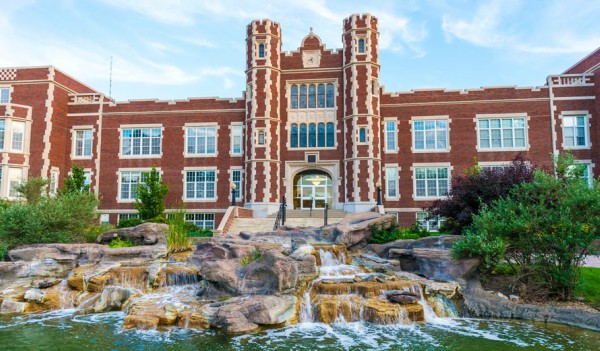In order to provide prospective students with the best chance at having a great education, we have compiled this list of the top homeland security programs in the country. Some schools may be the best online homeland security schools while others may focus exclusively on the traditional, on-campus aspect of higher education. Regardless of the delivery format, these schools excel at providing a quality education for their students.
The U.S. Department of Homeland Security was created in response to the 9/11 terrorist attack. The department’s main efforts are to prevent, address, and respond to terrorism, natural disasters, and other large threats placed on human life and American property. Due to this organization being established, the best online colleges created degrees and programs that deal with emergency management, homeland security, and information security to prepare individuals who want to be involved in protecting America’s infrastructure. Online homeland security schools and programs have been made available through many developing and well-known universities.
A homeland security degree is becoming more prevalent in the online community. Students are open to a variety of careers within the industry. With a diverse curriculum, students gain a significant amount of knowledge to prepare them for roles post-graduation.
Choosing to pursue one of the best homeland security degree options through an online homeland security college can be beneficial to a student’s schedule, finances, and time. Most homeland security degree colleges have an accelerated option, as well as other flexible alternatives to completing the degree. Many students value online degrees and the freedom it gives to those with a busy schedule who are simultaneously trying to pursue their education.
| Rank | School | Location |
|---|---|---|
| 1 | University of Florida | Gainesville, Florida |
| 2 | University of Alaska – Fairbanks | Fairbanks, Alaska |
| 3 | Grantham University | Lenexa, Kansas |
| 4 | Saint Leo University | St. Leo, Florida |
| 5 | National University | San Diego, California |
Here are the Best Homeland Security Schools
University of Florida

The University of Florida is the best school for homeland security degree in 2021. It has developed a unique degree in Emergency Services. High levels of training and education are required to pursue careers within the emergency field. UF has created courses related to response, planning, and disaster management. By completing a degree in emergency services, a variety of job opportunities is made available to students on local, state, and national levels.
School Overview
University of Alaska – Fairbanks

The University of Alaska-Fairbanks is one of the best online schools for homeland security. It helps students develop skills through their online homeland defense program to progress in their career. From the Homeland Security and Emergency Management bachelor’s program, students have the option to choose a concentration such as cybersecurity, emergency management, fire management, and more. UAF is passionate about quality education at an affordable price and has made tuition the same flat rate for both in and out of state students. Through these programs, students will be placed in real-life scenarios to demonstrate skills learned and to better prepare students for careers after completing their degree.
School Overview
Grantham University

Grantham University is one of the best homeland security degree schools in the nation. Through its Criminal Justice program specializing in Homeland Security prepares students for jobs within border security, intelligence, disaster planning, and terrorist prevention. Starting with the basics the program teaches students to analyze theories and concepts throughout the course. Grantham understands the importance that criminal justice and homeland security has in society, and has developed a program that reflects the value of the fields.
School Overview
Saint Leo University

As a Catholic Liberal Arts University, SLU has become an innovative learning community that many students have excelled in. With the option to specialize in Homeland Security, Saint Leo offers an excellent bachelor’s program in criminal justice. Courses explore the modern middle east, legal issues with terrorism, and exploitable weaknesses in terrorist organizations. Students who do not have professional experience can be placed in field programs to experience real life situations and even earn a police standard certificate. Additional programs and clubs are available at Saint Leo to network as a student for future endeavors.
School Overview
National University

Understanding the need for flexible accredited online learning options, NU has developed career oriented degrees to all students to better fit their needs. The Homeland Security and Emergency Management degree give students the fundamentals of situations they may come in contact with in their careers. Courses teach about security issues, cultures of terrorism, emergency preparedness, and more. Students looking to complete their degree quickly can take part in the accelerated program to finish. In the final senior year of the program, students are required to take part in a supervised senior project that includes detailed research and writing requirements. From the coursework required, students will gain the knowledge to pursue a variety of career options.
School Overview
Kansas Wesleyan University

Kansas Wesleyan University has a one of a kind Emergency Management program that allows students to explore several different avenues of emergency management, including homeland security. With the choice between three concentrations for majors and options for minors, KWU ensures hands-on experience through required internships and will help students pick a career option.
School Overview
Vincennes University

Vincennes University was founded in 1801 and offers 2-year and 4-year academic degrees. The homeland security degree teaches students about national security, terrorism, emergency management, and corporation loss prevention. The program is led by educators with over 25 years of experience. Within the program, students will be introduced to the different avenues within homeland security to help them choose a career.
School Overview
Utica College

Utica College offers degrees in Cyber Security with the specialization of Homeland Security and Emergency Management. The program integrates aspects of criminology, economic crime, computer science and more. Utica College is a national leader in cyber education, and with cyber security professionals at a high demand, Utica prepares its students to be experts in all fields related. Utica prides itself on its award winning faculty that has lead to the success of many students careers.
School Overview
Tulane University

Known as one of the most respected Universities in the south, Tulane University has been at the center of development and learning within the region. Its Homeland Security Program is a great fit for those who care about safety and security for America. Many career opportunities are available with homeland security such as public safety organizations, government agencies, and private corporations. Tulane keeps its curriculum up to date with practical learning.
School Overview
Liberty University

Students seeking an online homeland security degree are often drawn to Liberty University’s Criminal Justice Program which has a Homeland Security Emphasis. Liberty is home to over 100,000 online students with many options to pursue. A discount is provided for those who have previously served in the military or law enforcement and are choosing to enroll in the program through Liberty. The program consists of 120 credit hours, with a wide range of minors available if interested. The program includes classes such as criminal law, cyber security, counterterrorism, and more.
School Overview
Bellevue University

Bellevue University courses for Security Management are taught in a cohort format. Students who are registered and on the same track, are placed into peer groups to promote interactive and engagement type learning while still online. The degree prepares students for security and managerial positions in private and public sectors. Concepts from many areas such as business, emergency preparedness, criminal justice and more are integrated to develop an understanding of homeland security and all that it entails. The courses that are chosen are critical to the security field, and graduates will be able to analyze security metrics and apply security theories to homeland security policies.
School Overview
Campbell University

Campbell first created its online programs with military and adult personnel in mind. With roughly 6,500 students Campbell provides unique learning opportunities from a Baptist perspective. The online homeland security degree begins with the basic and beginnings of the history of security in America. Students looking to switch to Campbell can transfer up to 64 hours of credits from a two-year university. The program concludes with a seminar to demonstrate applications and concepts learned from the program. With reasonable tuition, Campbell University is well known and respected in the online community.
School Overview
Anderson University

Anderson University, an affordable and non-profit university provides working towards a homeland security degree through its criminal justice program. The program is geared to students with little experience giving these students the fundamentals to grow their knowledge in homeland security preparedness. Graduating seniors are required to complete a seminar. This seminar includes a research project, focusing on something they have learned throughout the program.
School Overview
Keiser University – Fort Lauderdale

Keiser University is dedicated to serving its online students to help them take the next step toward achieving their career goals. The homeland security bachelor degree prepares students for managerial positions within the field. Field placements during the program are not required, however, are still an option if students want that extra experience. The main purpose of the program is to prepare and inform graduates of current issues that threaten American society.
School Overview
Concordia University – Portland

Concordia University is a private liberal art Christian Institution that is made up of approximately 74% online learners. The Homeland Security program provides leadership in emergency training, as well as critical thinking and ethical decision-making skills. Enrolled full-time students have the option of completing this degree in as little as 16 months. Topics covered in the major provide students with the knowledge and understanding of factors that contribute to terrorism and how to better protect American Society.
School Overview
Drury University

Drury University has an extensive internship and experiential learning program that is known for its excellent value. Drury offers a bachelor’s degree in Emergency management, that promotes student support for online working students. Through professional practice, the fundamentals of emergency management are highlighted within the courses.
School Overview
Arizona State University

Arizona State University provides one of the largest online community for students. ASU’s focus and investment in the online space have created a high standard for online programs. Offering an online degree in Public Service and Public Policy which concentrates on Emergency Management and Homeland Security. The program is made for students to be able to approach and handle critical situations in the most effective way. Within recent years the need for public security and emergency management has increased. Through ASU’s program, scientific and technical skills will be developed. ASU has provided education to many highly ranked individuals who have progressed within the public service and policy career field.
School Overview
Pennsylvania State University

With five different areas of specialization, Pennsylvania State has designed courses for real-world application for local, state and federal levels dealing with homeland security. Penn State ensures that the quality of learning online is the same as in-person learning. The online community within Penn State is very diverse, allowing students to learn and network with each other.
School Overview
Saint Joseph’s University

The Homeland Security Program at Saint Joseph’s University is designed to enhance training of those who are currently involved in criminal justice and public safety type of jobs or organizations. Students have access to a network of professionals and experienced faculty who provide students with the extensive knowledge to expand their skills. From a Catholic foundation, SJU proudly serves its students and continues to grow its online programs to better fit the needs of working students.
School Overview
Mercy College

Through Mercy’s business program a Corporate and Homeland Security degree can be obtained by those who want to protect America’s infrastructure from terrorist attacks. Public safety, criminal justice, emergency management, and federal law enforcement roles are easily available to those who continue on after the program. While enrolled, a wide selection of internships is available to students in certain fields that they may be interested in. Hands-on experience is still a priority to Mercy even in an online setting. Mercy has been serving online students for 67 years and has educated many strong individuals.
School Overview
Angelo State University

Angelo State University was founded in 1928 and offers both bachelors and masters degrees in homeland security. The programs are opened to any student and are specially designed to meet the specific interests of the military. The program covers terrorism, counter-terrorism, and other hazards and their responses. ASU has over 10,000 students enrolled and is one of the most military-friendly colleges found in Texas.
School Overview
Homeland Security Degree Programs Ranking Methodology
We know that finding the best school to fit your unique needs can be a huge challenge. For that reason, we work hard to develop lists of the best schools based on the characteristics most important to you. Whether that be the cost of attendance, student success, resources available, the flexibility of schedule, or any other number of important factors, we’ve got you covered. For more information about our ranking process and to find lists of schools based on specific characteristics, check out our methodology page.
Since the Department of Homeland Security (DHS) was established in 2001, the field’s job opportunities have grown exponentially.
If you’re interested in pursuing a career in the criminal justice system with a focus on terrorism, emergency management, border security, and everything in between, this is a degree worth checking out.
The DHS is one of the largest federal government agencies today, with a dedicated workforce of more than 240,000 employees.
What can you do after completing one of the best homeland security degree programs? What can you expect from the program? What are the educational requirements?
This article takes an in-depth look at the answers to these questions and more. Without further ado, here’s everything you need to know about it.
What Is Included With a Homeland Security Degree?
The DHS consists of the Transportation Security Administration (TSA), the Federal Emergency Management Agency (FEMA), Immigration Services, the Coast Guard, and the Secret Service.
Each of these agencies plays a unique role in the prevention of a terrorist attack through intelligence analysis, as well as the enhancement of public safety and national security, particularly at the U.S. borders and ports of entry. A bachelor’s degree prepares you for a homeland security job in any of those agencies within the department. Here are some of the different courses you can expect in one of the best homeland security degree programs.
Border Patrol and Coastal Security
In this course, students review the existing security measures along the US borders and coastlines. You can expect to learn about typical border issues that the country grapples with, the sources of potential threats to the border and coastal security, and the necessary actions the law enforcement authorities take to curb these threats.
You’ll also learn about what border patrol agents do, as well as the technology they use to detect and prevent individuals from crossing the border illegally, criminals from smuggling drugs and weapons, and terrorists from sneaking into the country.
Critical Infrastructure Protection
Critical infrastructure refers to the physical and cyber assets belonging to the United States, whose destruction or incapacitation would have severely debilitating effects on public safety and health or the country’s economic and physical security.
These are generally classified into different areas. They include the chemical sector, commercial facilities sector, communications and cybersecurity sector, energy sector, nuclear materials, reactors, waste sector, food, and agriculture sectors.
This course would teach you about these and other infrastructure systems in the country, how they are linked, as well as their potential vulnerabilities and the threats they face. You’ll learn about what goes into the planning, preparation, and implementation of preventive and protective measures and programs.
Emergency Management
This degree course is designed to prepare you to become a homeland security professional in the public or private sector and equip you with the skills and expertise to respond to all forms of major disasters.
You’ll learn about the five national disaster preparedness areas of crisis prevention, protection, mitigation, response, and recovery. You’ll examine the various business continuity, law enforcement, and emergency management issues that come with disasters and how to navigate them in your day-to-day work.
Legal and Ethical Issues
A homeland security program with this course provides an in-depth view of the field’s legal and ethical issues. You’ll learn everything you need to know about homeland security legislation, executive orders, as well as international law, declarations, and conventions.
The main goal of the course is to teach you how to balance the objectives, mission, and strategies of the DHS without infringing on the civil rights and liberties of US citizens as prescribed in the Constitution, as well as those of foreign nationals.
Issues to do with the use of surveillance, cybersecurity, transportation security, and immigration also form part of the curriculum.
National Security and Intelligence Analysis
In this course, students learn about the growth and development of national security in the country and how it has evolved over the years to become what it is today. It explores the critical role of intelligence in averting potential national security issues, its contribution to some of the major events in history, and the lessons learned from those lapses.
You’ll also learn about the methods of intelligence collection and their respective strengths and weaknesses, the ethical issues surrounding intelligence operations, and how US intelligence agencies assess and counter threats to the US and global security.
Psychology of Terrorism
Terrorism is often described as a type of psychological warfare that induces feelings of fear and vulnerability. In this course, you’ll explore all aspects of terrorism from a psychological standpoint to understand the contributory factors that lead to the rise of terrorists and their organizations.
You’ll also explore the impact that a terrorist attack has on communities, families, and individuals. You’ll learn about how counterterrorism agencies work, the criminal justice system laws that govern them, the threat and potential impact of terrorism in the communities, and strategies that promote resilience among survivors and victims of terrorist attacks.
Research Methods in Homeland Security
This course teaches students the basic research methods and writing skills required to prepare solid analytical products and research papers. You’ll also learn how to develop a proper research strategy, critically read and evaluate data, and communicate your findings in a clear, coherent, and concise way.
Unlike an associate’s degree, a bachelor’s online degree or on-campus graduate program allows you to personalize your curriculum in a specific homeland security concentration. Some of the popular concentration options include organizational leadership, information assurance, and fire management.
Some schools even offer a military leadership concentration with specialized courses in joint-force operations and crisis management.
Types of Degrees for Homeland Security
When choosing a study program, you need to think about what your individual career goals are, as well as the cost of the degree in the question. Some entry-level careers don’t require you to have a degree.
Nonetheless, if a competitive advantage is what you’re after, having an associate or bachelor’s degree will give you just that. This section explores the different degree programs available for individuals who want to pursue a career in homeland security.
Associate Degree in Homeland Security
An associate degree prepares graduates to work in various entry-level positions in specific departments of the agency. This means you can work as a customs officer, immigrant service agent, police officer, or even as a patrol agent.
You can choose to study online or on-campus, depending on your schedule or individual preference. Online homeland security degree programs are ideal for full-time working professionals as well as students with personal obligations that don’t allow them to be in school full-time. Recent high school graduates, however, usually opt for on-campus learning.
An associate’s program typically takes two years to complete and provides the stepping stone required to get your foot in the door. The potential homeland security study areas of focus you can expect to cover include:
- Introduction to Criminal Justice
- Fundamentals of Emergency Management
- Homeland Security Policy and Law
- Weapons of Mass Destruction
- Terrorism Response Planning
Some examples of associate homeland security degrees are Associate of Arts (AA) degree in homeland security, Associate of Science (AS) degree in homeland security, Associate of Applied Science (AAS) degree in homeland security, and Associate of Science (AS) degree in general studies with a concentration in homeland security.
The educational requirement for the program is a high school diploma or GED certificate. You’ll need 60 credits before you’re allowed to graduate.
Bachelor’s Degree in Homeland Security
A bachelor’s degree in homeland security allows you to qualify for positions in emergency management, law enforcement, and information security. You can also apply your expertise in criminological research and forensic investigations. The possibilities are virtually endless.
This means that you can work as a police officer or detective, correctional officer, information security analyst, emergency management director, and so forth. Graduates can pursue entry-level or mid-level employment opportunities in the DHS.
Most programs take four years to complete and require 120 credits before students can graduate. The potential homeland security study areas of focus you can expect to cover include:
- Risk Management and Emergency Preparedness
- Business Law and Policy
- Mobile Security
- Extremist Groups and Security
- Ethical Hacking
The educational requirements for a bachelor’s degree are:
- High school diploma or GED certificate
- Minimum high school GPA of 2.0-2.5, although this may vary depending on the specific program
- A score of 1,000 or higher on the SAT or 15 or higher on the ACT to demonstrate whether the applicant is ready for college-level studies
- ACCUPLACER exam for students who start their postsecondary education at community college but have plans to pursue a bachelor’s degree at a four-year university or college
- Transfer credits from regionally accredited institutions if the specific program you’re applying for requires it
The DHS usually hires homeland security graduates straight out of college and offers fellowships and internships to give individuals real-world experience. If you intend to work in a federal agency, you’ll need a security clearance for positions that involve access to sensitive or classified information.
Some potential bachelor degree programs worth looking into include a Bachelor of Science (BS) degree in homeland security, Bachelor of Arts (BA) degree in homeland security, and a Bachelor of Science (BS) degree in criminal justice with a concentration in homeland security.
Master’s Degree in Homeland Security
Although you can get into a homeland security career with a bachelor’s degree, if you intend to assume a leadership position after you graduate, a master’s degree in security is the way to do it. The degree equips students with the skills and knowledge to solve real-world problems that revolve around public safety and security-related issues.
Master’s programs are more focused, allowing you to specialize in areas like:
- Policy coordination
- Counterterrorism
- Cybersecurity
- Biosecurity
- Critical infrastructures
They take two years to complete and require between 25 and 60 credits, depending on the program in question, before you’re allowed to graduate. Once you do, you can apply for certification from various credentialing bodies like the Geographic Information Systems (GIS) Certification Institute and the International Information System Security Certification Consortium.
The educational requirements for a master’s degree are:
- Bachelor’s degree (or higher) from an institution accredited by the Council for Higher Education Accreditation
- Relevant work experience depending on the requirements of the specific program you’re applying to
- Relevant professional certifications if required
Be sure to check the official website of the various universities and colleges to learn more about the specific prerequisite qualifications of the master’s program you wish to pursue.
Some potential degree titles include a Master of Science (MS) degree in homeland security, a Master of criminal justice with a concentration in homeland security, and a Master of Science (MS) degree in counterterrorism and homeland security.
There’s a wide range of financial aid opportunities available for students looking to offset tuition costs. These are usually in the form of scholarships, grants, and loans.
The Science and Technology Directorate of the Department of Homeland Security, for instance, established the DHS Scholarship Program to offer financial support to undergraduate students pursuing degrees in the fields of mathematics, engineering, science, and technology.
Career Paths for Someone With a Degree in Homeland Security
One of the perks of pursuing a degree from one of the best colleges for homeland security is the job diversity that comes with it. Graduates get to choose from a wide range of career options in emergency management, public security, safety, and law enforcement.
There’s also the fact that most of the careers in the field offer unlimited room for professional growth, not to mention the huge earning potential that comes with them. According to the U.S. Bureau of Labor Statistics, the highest-earning 10 percent of homeland security analysts earn more than $158,860 per year. The highest-earning detectives, criminal investigators, and police earn more than $109,620 annually.
Keep in mind that continuing education beyond your degrees is important to stay up-to-date with emerging homeland security topics and issues. It’s the only way to remain competitive and cutting-edge in the field to better your prospects of advancing up the career ladder.That being said, here are some of the areas where you can work with various degree differences in homeland security.
Administrative Support, Human Resources, and Management
A degree in homeland security studies allows you to work in various administrative, personnel management, and human resource roles within the DHS. Your day-to-day work would involve carrying out employee recruitment, retention, furlough, compensation, and termination procedures.
You would also be responsible for organizing traumatic incident management programs, mobilizing volunteer community service, handling veterans’ employment, and more. Various administrative duties like payroll and accounting would fall in your docket as well.
Pursuing a homeland security career in this field is perfect for individuals passionate about people, workers’ rights, and all things personnel management. You could also use your degree to transition into similar roles in the private sector and nonprofit organizations. These also require the analytical and critical-thinking skills of professionals trained in homeland security careers.
Here are some specific careers and salaries for administrative support, human resources, and management positions, according to BLS. All salaries show the 2020 median pay per year of these positions:
- Human resource managers: $121,220
- Office and administrative support: $38,720
- Social and community service managers: $69,600
Education
If you have a background in teaching or instruction in addition to the specialized training you get in homeland security, you can work in an educational-related role with the DHS. The government-run Federal Enforcement Training Center offers continuing law enforcement training to professionals in the field.
You would work with experienced instructors and other experts in providing career-long training and education to DHS personnel. This would center on a wide range of topics like suicide prevention, emergency and crisis management and preparedness, bioterrorism, and lots more.
The DHS offers training to first responders, technical assistants, volunteers, and the general public. Review the median base salary for instructors as of March 2022, according to PayScale:
- Law enforcement instructor: $58,800
Emergency and Crisis Management
Professionals in emergency and crisis management roles are responsible for recognizing potential hazards, analyzing intelligence, and responding to disasters and emergencies. Pursuing a career in this field would require you to prepare for and craft well-calculated response and recovery strategies.
You would work with other agency members to help communities reduce risk, help emergency personnel prepare for all sorts of hazards, and help people get back on their feet after a disaster has disrupted their lives. This can be through providing monetary aid for both public and individual assistance.
The Federal Emergency Management Agency (FEMA) –the arm of the DHS you would be working in – has a grant program that offers federal assistance to state governments and specific nonprofit organizations following the Presidential declaration of a disaster. Here are the BLS 2020 median salaries of these careers:
- Emergency management director: $76,250
- Community health worker: $46,590
Law and Policy
Every operational and support function of the DHS must adhere to the existing government-implemented laws, directives, and regulations.
These guidelines require revisions and frequent updates to ensure that the operations of the agency don’t infringe on the constitutionally-protected civil liberties of US citizens and those of foreign nationals.
Professionals with homeland security degrees with a focus on policy analysis, state law, and federal law can work in various roles within the DHS. The Office for Civil Rights and Civil Liberties (CRCL) supports the mission of the DHS in securing the nation from threats within and beyond the borders while protecting individual equality, fairness, and liberty as prescribed by the law.
While working in the CRCL, your primary role would be to integrate these principles into the department’s activities by:
- Investigating civil rights and liberties complaints filed by the public regarding the activities, policies, or actions taken by DHS personnel
- Communicating with individuals whose civil rights and liberties may have been affected by DHS activities and educating them on the proper avenues for remedy
- Promoting workplace diversity, equal employment opportunity programs, and fair merit system principles
- Advising DHS personnel, leadership, as well as state and local partners to promote respect for civil rights and liberties in the development and implementation of new policies
Law Enforcement
Professionals with a criminal justice degree in homeland security employed in the DHS Office for State and Local Law Enforcement work with various law-enforcement agencies across the country to enforce existing laws and coordinate responses to different types of dangerous situations and crises.
Taking up this role means that you would essentially be a department liaison between various criminal justice officers and the on-the-ground personnel in their day-to-day operations. A degree in homeland security can help prepare you for the following law enforcement roles:
- Police and detectives: $67,290
- Police and Sheriff’s patrol officers: $70,750
Science and Technology
As a science and technology professional in the DHS, your role would be to help in the development of critical tools and technologies that the department requires to fulfill its responsibilities.
You may also work in other industries outside the government, which require the specialized knowledge and expertise of individuals with homeland security degrees. Some of these include large corporations, manufacturing firms, engineering companies, and so forth. You can also work in academia alongside next-generation research and development experts.
Transportation, Immigration, and Travel Safety
Last but certainly not least is the transport, immigration, and travel safety sector. Border control and immigration remain one of the department’s topmost priorities. It requires a lot of hands-on manpower, from cybersecurity professionals to patrol officers keeping watch at physical posts along the nation’s borders.
A homeland security major can find employment in various roles as a customs enforcement officer, secret service agent, or DHS immigration officer. These roles have the following salaries:
- Border patrol agent: Between $43,635 and $68,999
- Immigration officer: Median of approximately $59,800, according to PayScale
Top Homeland Security Degree Programs
Before you pursue an online bachelor’s or master’s degree in homeland security, you need to ensure that you pick an institution that’s accredited by an authority supported by the U.S. Department of Education and the Council for Higher Education Accreditation.
Other factors you need to consider when looking for a good homeland security program include:
Cost and Financial Aid
First, you need to be sure that you can afford your degree. Figure out how much the entire criminal justice program will cost and make sure it’s within your budget. Most online master’s and bachelor’s degree programs have lower-than-average per-credit tuition rates regardless of your state residency.
It also helps to find a school that offers scholarships and grant opportunities to help ease the financial burden.
Program Format
The next thing you need to look at is how the program is structured. In most cases, you’ll be able to take as many or as few classes per term as you wish. However, some institutions have a cohort learning format that requires students to take a predetermined number of courses with their peers for a specified duration. Pick a program that works for you.
Student Resources
Attending college is not for the faint of heart. It’s a grueling period in your life, and you’ll need to pass each phase before you can advance to the next. To enhance your chances of success, you want to attend an institution that provides a wide range of student resources that you can take advantage of.
A good homeland security degree program should include career resources like resume assistance and internship placement, as well as academic counseling and tutoring services.
Academic Majors
Finally, you want to pick one of the best homeland security degree program options that focus on your specific area of interest. If, for instance, you want a degree that specializes in cybersecurity, a program focused on counterterrorism may not be the right fit for you.


